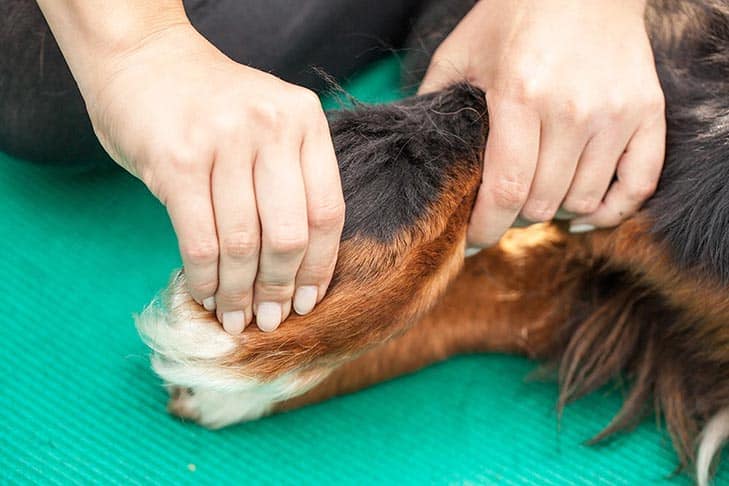Like people, dogs can experience health issues that affect their mobility and quality of life. Alongside traditional medicine, your veterinarian might suggest a holistic or whole-body approach to treating your dog. Complementary and alternative medicine is an umbrella term that captures different practices such as acupuncture, chiropractic, aromatherapy, hydrotherapy, massage, and herbal remedies.
According to the American Veterinary Chiropractic Association (AVCA), chiropractic involves manipulating the spine, extremities, or skull to treat disease. If your dog is predisposed to degenerative joint disease or is living with a debilitating condition, you might be wondering if they can benefit from canine chiropractic. Before looking for a canine chiropractor, however, make sure to consult with your veterinarian.
How Does Chiropractic Care For Dogs Work?
Dr. Amy Attas, VMD of New York-based practice City Pets, says that technically, any vertebrate (animal with a spinal column) could be a candidate for chiropractic treatment, which also includes dogs, rabbits, horses, and cows.

Dr. Jessica Paige, certified animal chiropractor and member of the International Veterinary Chiropractic Association (IVCA), explains that chiropractors focus on how the joints of the spine and extremities move. They relate these movements to a dog’s overall health and wellness, bridging the gap between them. When this movement is restricted, dogs can experience repetitive stress injuries and sprains.
Dr. Paige explains that most restrictions in joint movements are subclinical (meaning regular medical tests might not detect them). As a result, she says that many of the underlying issues go undetected until they manifest into a problem. Chiropractic care can relieve the pain and discomfort that these underlying issues cause, according to Dr. Attas. “Once that compression is removed, the patient has immediate relief.”
When is Chiropractic Care For Dogs Used?
Chiropractic treatment should supplement traditional vet care for joint, skeletal, and spinal ailments. These conditions include hip dysplasia, degenerative joint disease (osteoarthritis), chronic neck or back pain, intervertebral disk disease, and central nervous system disorders. Chiropractic can also serve as preventive care for dogs predisposed to joint or spinal diseases, or dogs prone to arthritis.
Dr. Attas notes that chiropractic can help “maintain appropriate posture and limb positioning to prevent problems from happening in the future.” For example, the results of a 2021 study suggest that chiropractic can help decrease the likelihood of Boxers developing spondylosis, a degenerative disease that affects the spine.
Is My Dog a Good Candidate For Canine Chiropractic?

Before embarking on this process, it’s always important to talk to your vet about whether your dog would benefit from canine chiropractic care. They may recommend chiropractic treatment for the following symptoms:
- Limping, weakness, or lameness in the front legs
- Pain in the hip or hind legs with no symptoms of arthritis
- Trouble standing or lying down
- Looking, yelping, or biting when being lifted and pressure is applied to the chest area
- Hunched back
- Yelping in pain after a sudden movement (with no other symptoms present)
- Muscle spasms along their back
- Inability to jump
- Not wanting to perform routine tasks
Chiropractic can also assist dogs suffering from a range of issues, including:
- Recovery after a fall, injury, or surgery
- Improving gait and range of motion for senior dogs
- Jaw problems or difficulty chewing
- Getting in and out of the car
- Bowel or bladder issues
- Injuries from dog sports
- Behavioral problems that might be tied to underlying medical conditions
- Easing the birthing process for pregnant dogs

You can search for qualified practitioners in your area. During the first visit, the chiropractor will assess your dog’s medical history. They will also conduct a neurologic exam and analyze your pet’s gait and motion. Typically, treatment requires more than one session. The cost will depend, in part, on the chiropractor’s level of experience.
Why Chiropractic Isn’t Safe For Puppies
Chiropractic is safe for many dogs but not for puppies. Dr. Attas says puppies aren’t good candidates for chiropractic because their musculoskeletal system isn’t fully formed yet. “There’s a potential for injury if manipulations are done on such young animals,” she says.
To promote optimal health for your puppy, discuss with your vet and your breeder how much exercise is appropriate. In addition to exercise, you can feed them a well-balanced diet, keep them at an appropriate weight, and train them not to jump on and off furniture (which can strain growing muscles).
Are Dog Chiropractors Safe?
Although chiropractic may be a safe and effective way to treat numerous disorders, Dr. Attas specifies that “it has to be done correctly by someone who is trained and certified.” This is because chiropractic involves physically manipulating the spine or other parts of the musculoskeletal system. If this procedure is done incorrectly or with too much force, it can cause pain or irreversible damage to your pet.
Different states have different rules concerning animal chiropractic. Some states require a referral, while, in others, chiropractors can see patients without veterinary supervision. “California, for example, requires animal chiropractors to work under the direct supervision of a veterinarian,” Dr. Paige says. Most chiropractors and veterinarians agree that both parties should have primary care veterinarians for their animals, and chiropractors should advise owners to see a veterinarian for primary care. Always consult your vet before seeking chiropractic treatment for your dog.
 ©New Africa – stock.adobe.com
©New Africa – stock.adobe.com

According to the American Veterinary Medical Association (AVMA) Model Veterinary Practice Act (MVPA), this practice of veterinary medicine includes “complementary, alternative, and integrative therapies.” The AVMA defines these methods as a diverse group of “preventive, diagnostic, and therapeutic philosophies and practice” that aren’t considered part of conventional medicine (as practiced by most vet and vet techs). Among these varied therapies is “veterinary manual or manipulative therapy,” or treatment based on techniques drawn from osteopathy or chiropractic. The organization clarifies that consent should be obtained and included in the medical record before starting any type of treatment, including those in this category.
What Certifications Are Required for Dog Chiropractors?
When visiting a dog chiropractor, you want to ensure that you’re going to a trusted, licensed professional. Anyone practicing animal chiropractic must obtain certification as an animal or veterinary chiropractor. Someone who is certified as a human chiropractor can become an animal chiropractor with additional training from an accredited school on how to adjust animals. Afterward, they can apply for certification from the AVCA or the IVCA.
To become a veterinary chiropractor, a licensed veterinarian can get certified by the AVCA or IVCA in chiropractic medicine. “Both AVCA and IVCA require you to pass a written and practical exam to become a member of their association,” Dr. Paige says. Once certified, practitioners must renew their certifications every three years.
Since chiropractic doesn’t require specialized equipment, a dog chiropractor can make house calls. “I typically provide at-home exercises or stretches for an owner to do with their canine to help the pet improve faster,” Dr. Paige says.
Ultimately, the success of treatment depends on the chiropractor’s skills and knowledge, the severity of the condition, and how long the dog has dealt with the ailment. Canine chiropractors need to be properly trained and certified to deliver treatment safely and effectively.
If your dog is seeing a chiropractor, it’s important to keep them and your vet informed of any treatments your pet is undergoing. This way, you can avoid any complications caused by combining medications or treatments.







